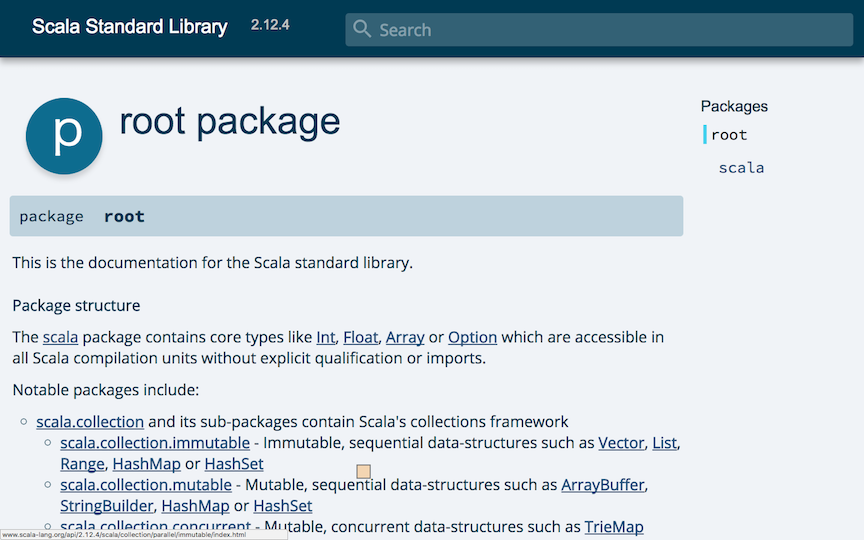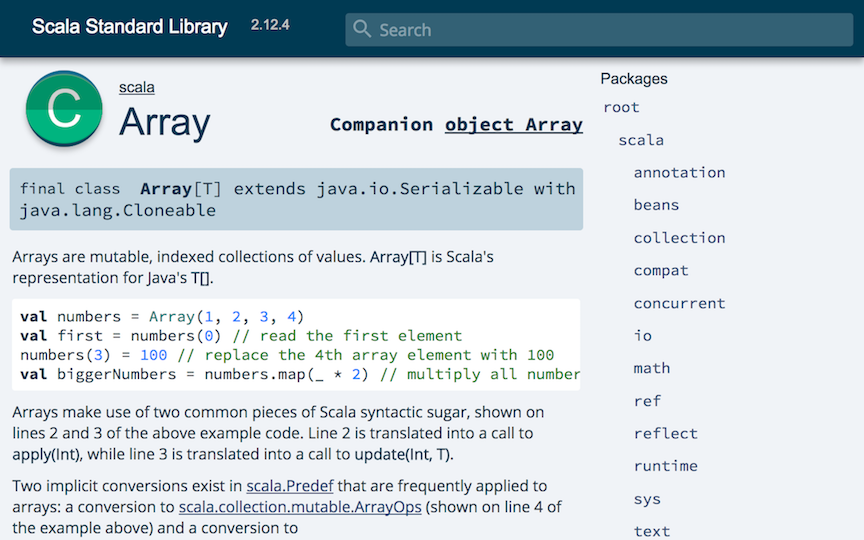PRG1 (8): 多相型
Ken Wakita (https://is-prg1b.github.io/lecture/)
2017.10.27
多層型
findFirstInt
def findFirstInt(key: Int, seq: List[Int]): Option[Int] = {
def aux(i: Int, seq: List[Int]): Option[Int] = {
seq match {
case Nil => None
case x :: _ if x == key => Some(i)
case _ :: rest => aux(i + 1, rest)
}
}
aux(0, seq)
}findFirstInt: 配列 (ss: Array[Int]) のなかから、検索キーの数 (key: Int) に合致する最初のデータの位置を返す。見つからない場合は -1 を返す。
findFirstString
def findFirstString(key: String, seq: List[String]): Option[Int] = {
def aux(i: Int, seq: List[String]): Option[Int] = {
seq match {
case Nil => None
case x :: _ if x == key => Some(i)
case _ :: rest => aux(i + 1, rest)
}
}
aux(0, seq)
}findFirstString: 配列 (ss: Array[String]) のなかから、検索キーの文字列 (key: String) に合致する最初のデータの位置を返す。見つからない場合は -1 を返す。
findFirst{String vs Int}
def findFirstInt(key: Int, seq: List[Int]): Option[Int] = {
def aux(i: Int, seq: List[Int]): Option[Int] = {
seq match {
case Nil => None
case x :: _ if x == key => Some(i)
case _ :: rest => aux(i + 1, rest)
}
}
aux(0, seq)
}def findFirstString(key: String, seq: List[String]): Option[Int] = {
def aux(i: Int, seq: List[String]): Option[Int] = {
seq match {
case Nil => None
case x :: _ if x == key => Some(i)
case _ :: rest => aux(i + 1, rest)
}
}
aux(0, seq)
}瓜ふたつ.違いはどこ?
findFirst{String vs Int}
def findFirstInt(key: Int, seq: List[Int]): Option[Int] = {
def aux(i: Int, seq: List[Int]): Option[Int] = {
seq match {
case Nil => None
case x :: _ if x == key => Some(i)
case _ :: rest => aux(i + 1, rest)
}
}
aux(0, seq)
}def findFirstString(key: String, seq: List[String]): Option[Int] = {
def aux(i: Int, seq: List[String]): Option[Int] = {
seq match {
case Nil => None
case x :: _ if x == key => Some(i)
case _ :: rest => aux(i + 1, rest)
}
}
aux(0, seq)
}- 関数名
findFirst{String vs Int}
def findFirstInt(key: Int, seq: List[Int]): Option[Int] = {
def aux(i: Int, seq: List[Int]): Option[Int] = {
seq match {
case Nil => None
case x :: _ if x == key => Some(i)
case _ :: rest => aux(i + 1, rest)
}
}
aux(0, seq)
}def findFirstString(key: String, seq: List[String]): Option[Int] = {
def aux(i: Int, seq: List[String]): Option[Int] = {
seq match {
case Nil => None
case x :: _ if x == key => Some(i)
case _ :: rest => aux(i + 1, rest)
}
}
aux(0, seq)
}- 関数名
- 引数の型
findFirst{String vs Int}
def findFirstInt(key: Int, seq: List[Int]): Option[Int] = {
def aux(i: Int, seq: List[Int]): Option[Int] = {
seq match {
case Nil => None
case x :: _ if x == key => Some(i)
case _ :: rest => aux(i + 1, rest)
}
}
aux(0, seq)
}def findFirstString(key: String, seq: List[String]): Option[Int] = {
def aux(i: Int, seq: List[String]): Option[Int] = {
seq match {
case Nil => None
case x :: _ if x == key => Some(i)
case _ :: rest => aux(i + 1, rest)
}
}
aux(0, seq)
}- 関数名
- 引数の型
findFirst{String vs Int}
def findFirstInt(key: Int, seq: List[Int]): Option[Int] = {
def aux(i: Int, seq: List[Int]): Option[Int] = {
seq match {
case Nil => None
case x :: _ if x == key => Some(i)
case _ :: rest => aux(i + 1, rest)
}
}
aux(0, seq)
}def findFirstString(key: String, seq: List[String]): Option[Int] = {
def aux(i: Int, seq: List[String]): Option[Int] = {
seq match {
case Nil => None
case x :: _ if x == key => Some(i)
case _ :: rest => aux(i + 1, rest)
}
}
aux(0, seq)
}- 関数名
- 引数の型
auxの引数の型
関数の多重定義:findFirst
def findFirst(key: Int, seq: List[Int]): Option[Int] = {
def aux(i: Int, seq: List[Int]): Option[Int] = {
seq match {
case Nil => None
case x :: _ if x == key => Some(i)
case _ :: rest => aux(i + 1, rest)
}
}
aux(0, seq)
}def findFirst(key: String, seq: List[String]): Option[Int] = {
def aux(i: Int, seq: List[String]): Option[Int] = {
seq match {
case Nil => None
case x :: _ if x == key => Some(i)
case _ :: rest => aux(i + 1, rest)
}
}
aux(0, seq)
}- 多重定義 (Overloading)
- 名前が同じで引数の型だけが異なる関数群を用意すること,あるいは同じ演算記号について引数の型に応じて異なる意味を与えること.
型変数 A
型変数の導入:
def findFirst[A] ...新たな型変数
Aを導入する。その変数Aの有効範囲はdefの範囲。型変数
Aの意味:「ある型があって、その名前をひとまずAとしておこう」、(簡単に)「任意の型Aについて」
- 型構成子の型変数への適用:
Array[A]Array[A]: 任意の型Aに関して、型構成子Arrayを型Aについて特殊化したもの。Arrayの場合AはArrayが表す配列が要素とするデータの型なので、Array[A]は、A型のデータを要素とする配列の型と読める。
class Array[T]が提供する単相関数
型変数に依存しない関数群
def isEmpty: Boolean
def length: Int
def size: Intclass Array[T]が提供する多相関数
出現する型変数が T だけで、返り値の型が単純なもの
def indexOf(T): int
def forall(p: (T) ⇒ Boolean): Boolean // ∀
exists(p: (T) ⇒ Boolean): Boolean // ∃
def indexOf(elem: T): int // Array(1, 2, 3).indexOf(3) => 2
def count(p: (T) ⇒ Boolean): Int
// Range(1,…, 99).toArray.count(奇数) => 50class Array[T]が提供する多相関数
出現する型変数がTだけで、返り値の型がTを含むもの
def head: T
def last: T
def init: Array[T] // Array(Vn, v) => Array(Vn)
def tail: Array[T] // Array(v, Vn) => Array(Vn)
def take(Int): Array[T] // Array(Vk, v, …) => Array(Vk)
drop(Int): Array[T] // Array(Vk, v, …) => Array(v, …)class Array[T]が提供する多相関数
型変数Tが引数にも返り値にも出現するもの
def filter((T) ⇒ Boolean): Array[T]
// Array(1, 2, 3, 4, 5).filter(奇数) => Array(1, 3, 5)
// Array(1, 2, 3, 4, 5).filter((n: Int) => n%2==1)
def foldLeft[B](B) ((B, T) ⇒ B): Btrait Set[T] が提供する関数
isEmpty: Boolean
empty: Set[A]
contains(A): Boolean
diff(GenSet[A]): Set[A]
union(GenSet[A]): Set[A]
map[B]((A) ⇒ B): Set[B] // Array(1, 2, 3).map((x: Int) => x.toString)
subsets(): Iterator[Set[A]] // Set(1, 2, 3).subsets().foreach(println)Scala の API マニュアル
Scala の API マニュアル のさがし方
scaladoc で検索し,API メニューから Current を選択.慎重な人は All Versions から適切なものを選択
Scala の API マニュアル

Scala の超基本機能は右端の
scalaをクリックその他の機能は,このページの説明を参照.
Scala のドキュメントページの機能

パッケージ名がクリックできる
クラスと Companion オブジェクトの切り替え
traitを用いたドキュメントのフィルタ(慣れるとかなり便利)
ドキュメント閲覧ソフト
ドキュメントダウンロード機能でScala のドキュメントをダウンロードして利用.
どちらも利用できない人
本家のドキュメントをダウンロードして利用。自分が利用している Scala のバージョン(2.12.4 かな)のページを開き、API DocsのZipファイル (例えば scala-docs-2.12.4.zip) をダウンロードしたあとで展開して利用する。
クラスとCompanionオブジェクト (連れ合いのオブジェクト)
class Int vs object Int
class Array vs object Array
class List vs object List
trait Set vs object Setclass Int vs object Int
class Int
算術演算子: +, -, *, /
比較演算子: >, <, ==
ビット毎演算子
min, max, signumobject Int
Int.MaxValue (= 2147483647), Int.MinValue (= -2147483648) // class Intに関する情報
Int.toStringclass Array vs object Array
class Array については,すでに取り上げたので省略
object Array
empty[T]: Array[T]
emptyIntArray: Array[Int]
fill[T](Int)(elem: => T): Array[T]
// Array.fill(5)(3)
// Array.fill(100)(math.random)
ofDim[T](n1: Int, n2: Int): Array[Array[T]]
// Array.ofDim[Int](3, 4)
tabulate[T](n1: Int, n2: Int, n3: Int)(f: (Int, Int, Int) ⇒ T): Array[T]
// Array.tabulate[Double](3, 3)((n1: Int, n2: Int) => if (n1 == n2) 1.0 else 0.0)object List
empty[A]: List[A]
iterate[A](A, int)((A) ⇒ A)
//List.iterate(List.empty[Int], 4)((l: List[Int]) => 0::l)
range[T](T, T)
// List.range(0, 20, 3)